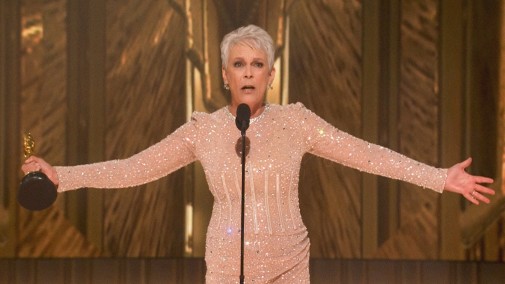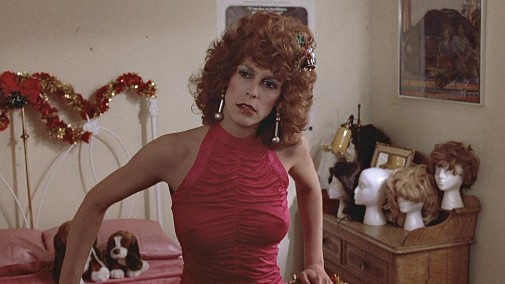
Yes, I know that title is ridiculous. After all, nepo baby extraordinaire Jamie Lee Curtis just achieved the highest form of recognition in her industry, winning the Best Supporting Actress Academy Award after having already nabbed a SAG in the same category. Moreover, Everything Everywhere All At Once, the film she's been championing ever since it premiered at last year's SXSW, became a sweeping sensation, our latest Best Picture champion. And yet, if you love the actress or have some fondness for her performance, social media has proved a hostile environment. It started way before the Oscar nominations when the possibility of Curtis making the lineup to Stephanie Hsu's detriment angered multitudes…
Racial bias was seen as one of the main reasons Curtis got some precursor nods over her costar. Considering the history of anti-Asian tendencies within awards bodies like the Academy, that's not an unfounded concern. However, to reduce another actress's success to that factor alone feels reductive. Moreover, there's the matter of a legendary career overshadowing a nascent one. Hsu's just getting started, while Jamie Lee Curtis has been a regular screen presence for nearly half a century. In addition to that, she's someone whose legacy is titanic, frankly indissociable from the history of modern genre cinema.
 HALLOWEEN (1978) John Carpenter
HALLOWEEN (1978) John Carpenter
Jamie Lee Curtis' first film role came in 1978, with John Carpenter's Halloween, whose success redefined American horror, pouring fuel into the blazing fire from which the 80s slashers would emerge, demon-like and voracious. Playing Laurie Strode, the actress hit the ground running, reclaiming the title of Scream Queen from her mother, the original Marion Crane in Psycho. But beyond historical importance or pop culture footprint, it's a great star turn, grounding the nightmare-logic inherent to the premise and making the ludicrous feel viscerally real. Curtis has a talent for that sort of thing, imbuing humanity into roles that could otherwise appear flat, thankless, disposable.
That ability would elevate many a future horror flick, including a variety of Halloween sequels. Even in such trash as Prom Night, you can glimpse a full-bodied characterization every time the camera frames Curtis. Her physicality is also important, for it allowed the starlet to complicate the tenets of what would become the final girl archetype, courting erotic registers that reached out to the mainstream. In other words, she had a rocking body. She put it to good use, trying her hand at biopic sexpot in a TV movie about Dorothy Stratten before making a career transition that would broaden artistic horizons.
 TRADING PLACES (1983) John Landis
TRADING PLACES (1983) John Landis
Trading Places saw Jamie Lee Curtis transform from a scream queen to a comedy bombshell, playing a sex worker with a heart of gold intent on helping a stockbroker whose life has been ruined by a pair of cruel millionaire brothers. The picture is dated, but it's a hoot with a smashing third act and a cast to die for. In truth, I shouldn't write too much about it here since Curtis' performance would make a good Almost There case. She won the BAFTA for it, her first major award. For the rest of the 80s, horror would continue to give way to comedy, culminating in 1988's A Fish Called Wanda, for which the actress received Globe and BAFTA nominations.
At the dawn of the 90s, another genre jump took place, though neither the horrific nor the humorous were ever abandoned. With Kathryn Bigelow's Blue Steel, Jamie Lee Curtis proved she could be an action star, delivering what may well be the peak of her work as a dramatic actress. Other opportunities within the action genre would follow, including James Cameron's True Lies and another brush with awards glory. And yet, the Academy always ignored her. The reason why is easy enough to spot – Jamie Lee Curtis, as a star, was defined by the kinds of movies and roles AMPAS likes to pretend don't exist or don't deserve accolades. Horror, comedy, and action are not the things that should make up a serious actress' specialty, it seems.
And so it was that, even as she kept doing awards-worthy stuff in titles like H20 and Freaky Friday, the prestige of an Oscar was always distant. Aging didn't help, the sexpot roles drying up, the industry's ageism pushing Curtis to the side.
Partly, that's why so much of the dismissiveness toward her victory feels cruel. Go on Twitter, and you'll find various people stating that Curtis does nothing in Everything Everywhere All At Once. They also claim it's a silly role, too small and inconsequential to warrant accolades. Comparisons to Hsu abound, often juxtaposing the vanity-free silliness that characterizes most of Curtis' screen time with the younger actress' tearful scenes.
The same logic precluded the veteran star from getting plaudits for her entire career. When it comes down to it, even this movie's fans don't think genre acting is awards-worthy acting. Not when you have Stephanie Hsu tackling Jobu/Joy's final redemption, Kerry Condon leaving Inisherin in a mix of heartbreak and hope, or Angela Bassett serving Oscar-clip realness in Wakanda Forever. I get it, and will probably write about Bassett in the future, mourn how she has suffered from the Academy's racial biases. Still, to say Jamie Lee Curtis is a horrible winner feels a step too far. Saying she does nothing in Everything Everywhere All At Once is plain wrong.
So far, I've mostly made a case for this victory as a career win. However, many Oscar obsessives despise those, declaring that it should be all about individual performances. In theory, I'm inclined to agree. But, even then, Curtis isn't a worthless candidate for a win – not to me. Not to Nathaniel, who included her as a silver medallist in his Film Bitch Awards and has been doing a valiant job defending the Oscar win in the wilderness of Film Twitter. So, let's try supporting this supporting performance.

In the movie, Curtis plays Mrs. Deirdre Beaubeirdre, an IRS auditor who the Wang family meets to assess their financial situation. Right from the start, we're led to perceive the character as a mundane antagonist, her looks derived from a stock photo, her attitude a cranky caricature. She's the kind of bureaucratic tyrant who will delight in exerting what little power they have over those at their mercy. Regard that vile little smile as she offhandedly mentions the advent of charging the laundry owners with fraud, or the rehearsed nature of her "I see a story" spiel. There's a lot there, from mugging theatricality made hilarious through abrupt cuts to the aggressive way she trashes a plastic bottle.

Structurally, Deirdre exists within Evelyn's story as an obstacle to be confronted, but both the film and the actress suggest there's more to her than that. For instance, she has a soft spot for Waymond, and the hostility toward Evelyn feels personal. Maybe she sees a bit of herself in the other woman and doesn't like what she sees? As we'll discover in our odyssey across the multiverse, the foundation of Deirdre's soul is a pit of bitterness and resentment, lives' worth of disappointments leading her to conclude she doesn't deserve love. The only pleasure to be had is in the wielding of power or the service to a higher purpose, whether that's the IRS or the church of Jobu 'Nothing Matters' Tupaki.
There's sadistic delight in her interactions with Evelyn that intercuts with genuine befuddlement over the Wang matriarch's odd behavior. When an alternate version of Deirdre manifests, the audience is quick to judge – this is just the extreme of her current personality, all that aggression turned physical, perhaps cosmical. On a technical level, the deskbound Deirdre's slumped posture and inelegant movements turn into hulking awkwardness when she shows up as a killing machine. More than her colleagues, Curtis has to navigate tonal jumps without the safety net of a solid character, existing primarily as a collage of gags from which, in the end, you can surmise a person. To learn how to see Deirdre is to learn how to see Everything Everywhere All At Once.
Before form shatters, Curtis already serves as a pathway for the multiplicity of registers that come with the multiverse. From threat, she goes back to piteous cartoon with a swift chop, only to resurface as despair personified when preaching the Tupaki gospel – in a deleted scene, she even kills herself after a pithy comment from Jobu. When we next see her, she's stapling her forehead and summoning the skills of a pro-wrestler Deirdre. Only, unlike the grace of Quan and Yeoh, Curtis performs the stunts with insane expressions and even a spasm of pain. Even as she overpowers Waymond, it seems like the skills of another world's Deirdre can't make up for this universe's body.
It's a great piece of negotiating tone, grounding the lunacy, paradoxically surrendering to the preposterous and the absurd. I love the tiny details peppered throughout, like Deirdre reaching for the pet pig once Elvis Jobu enters the building. These flashes of humanity continue with the introduction of hot-dog fingers Deirdre, who, somehow, found herself in a romantic relationship with that universe's Evelyn. She might be the most demonstrably sad ideation of the figure, delineating a painful break-up and reconciliation in quick flashes that pop up throughout the narrative's third act. Yet again, Curtis is asked to project earnest feeling while looking foolish, dancing around with sausage gloves and not a stitch of irony.
And then IRS Deirdre interrupts the Wang's New Year's celebration with the police in tow. Reeling from Evelyn's disrespect, she looks outraged and terrified, only getting to do her hunched-over domineering routine when talking to Waymond. But then, in one posture shift, Curtis dramatizes bitterness abandoned, a sudden change of heart. Evelyn doesn't understand - not immediately - but the audience does, thanks to the actors. Such matters become clearer to the chaotic mother once we enter the final stage of our conflict. It's time to follow Waymond's example and fight with empathy.
The defeat of Deirdre depends on the sudden realization that this cold unlovable bitch is a person, thus worthy of our attention. It's a total tonal shift central to the film's sentimental thesis and depends on Curtis' ability to transcend caricature for some 'blink, and you'll miss it' movements. Whether it's a shot of quiet tears or two angry broads reaching an understanding while sharing a smoke and feeling like teens again, she deepens the character. It culminates in a perfectly ambiguous line reading – "I feel nothing."
Does she really feel nothing after all this and is crying about that tragedy, the ultimate doom of apathy and emptiness? Or does she feel too much and crumbles under the weight?
Curtis' delivery allows for both realities, enriching the film in the moment and on re-watch, on retroactive reflection. That's something worth celebrating, surely. It's something, at the very least. It may not be my choice for the best performance of 2022, but it's NOT nothing. Yes, Jamie Lee Curtis has been better before, funnier, bolder perhaps. That doesn't make this performance an objectively bad one. That doesn't make the Oscar-winning actress a justifiable target for all the internet's vitriol. In the end, Laurie Strode won an Academy Award, and that's unbelievably cool. A living legend who many had assumed would only get such honors if they were in Honorary won for the kind of role that seldom garners such industry validation. One can mourn another actress' loss without tearing down another. At least, I hope we can.














